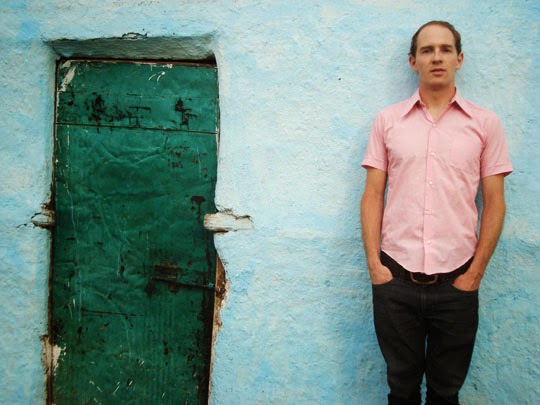(released 13.10.14)
Backspace Unwind is
electronic duo Lamb’s (Lou Rhodes & Andy Barlow) second release since they
reformed in 2011. Their previous album, 5,
signalled a change from the drum’n’bass/trip-hop/jazz blend, that had brought
them initial recognition, to a more stripped back sound. Backspace Unwind takes a similar minimalist approach whilst
appearing to draw influences from a more diverse range of genres. There is less
of a consistent sound throughout the album than 5, with the record flitting between genres like a impatient child.
For example, the opener, In Binary,
features a distorted synth characteristic of the industrial techno created by
Gesaffelstein, the pulsing bassline of the title track reveals allegiances to
trance, Nobody Else has a definite
jazz slink to it reminiscent of Portishead, and the chanting sample and vocal
phrasing in Only Our Skin makes the
song sound like a Roman Catholic sermon.
 One of the most prominent features of the album is the
dichotomy between the more electronic focused songs, and the songs which feature
more organic instrumentation. Unlike some of Lamb’s earlier work there is less
overlap between these two elements of their sound. This results in a definitive
split between songs which can be categorised as dance-orientated, featuring throbbing
basslines, processed synths and grooved percussion, or song-orientated, led by
Rhodes’ voice, accompanied by piano or strings. Whilst this dynamic keeps the
flow of the album interesting, I find it creates a feeling of incoherence
throughout the record. For example, the techno stomp of In Binary feels incongruent with the piano-balladry of As Satellites Go By and the only common
sonic element in a lot of the songs seems to be Rhodes’ voice.
One of the most prominent features of the album is the
dichotomy between the more electronic focused songs, and the songs which feature
more organic instrumentation. Unlike some of Lamb’s earlier work there is less
overlap between these two elements of their sound. This results in a definitive
split between songs which can be categorised as dance-orientated, featuring throbbing
basslines, processed synths and grooved percussion, or song-orientated, led by
Rhodes’ voice, accompanied by piano or strings. Whilst this dynamic keeps the
flow of the album interesting, I find it creates a feeling of incoherence
throughout the record. For example, the techno stomp of In Binary feels incongruent with the piano-balladry of As Satellites Go By and the only common
sonic element in a lot of the songs seems to be Rhodes’ voice. Despite the disconnected feel of the album as a whole, Backspace Unwind has some interesting
moments. Barlow’s intricate soundscapes often create an engrossing backdrop to
Rhodes’ exquisite voice as is clear on tracks such as What Makes Us Human and Seven
Sails. Lead single We Fall in Love
is one of the albums stronger offerings and is a prime example of the benefits
of their new stripped back sound; opening with a driven rhythm accompanied by sparse
vocals, a pulsing synth line is introduced followed by a shimmering bell-like
melody to contrast the otherwise dark feel of the song. Doves and Ravens is another highlight, featuring a cinematic string
arrangement by Tom Trapp, Rhodes’ distorted vocal whispers through a glacial
piano line whilst subtle percussion swells and falls with the flow of the song.
Despite the disconnected feel of the album as a whole, Backspace Unwind has some interesting
moments. Barlow’s intricate soundscapes often create an engrossing backdrop to
Rhodes’ exquisite voice as is clear on tracks such as What Makes Us Human and Seven
Sails. Lead single We Fall in Love
is one of the albums stronger offerings and is a prime example of the benefits
of their new stripped back sound; opening with a driven rhythm accompanied by sparse
vocals, a pulsing synth line is introduced followed by a shimmering bell-like
melody to contrast the otherwise dark feel of the song. Doves and Ravens is another highlight, featuring a cinematic string
arrangement by Tom Trapp, Rhodes’ distorted vocal whispers through a glacial
piano line whilst subtle percussion swells and falls with the flow of the song.
Backspace Unwind isn’t
a bad album, however, I didn’t feel there was that much that really grabbed me.
The band cited their influences for this album as “space” and “taking a
birdseye” view of the universe, I don’t feel they took this concept as far as
it could have been taken. Aside from the odd shallow reference to stars or
satellites, I felt this opportunity for quite an interesting theme was
squandered. A factor contributing to this may have been Rhodes’ new foray into
free-association lyrics, which seems to encourage writing without thinking.
This may have added to the lack of depth and cohesion I perceived when
listening to Backspace Unwind. On the contrary the combination of Rhodes’
unique voice and Barlow’s original production still manage to create some
captivating moments on this record.



